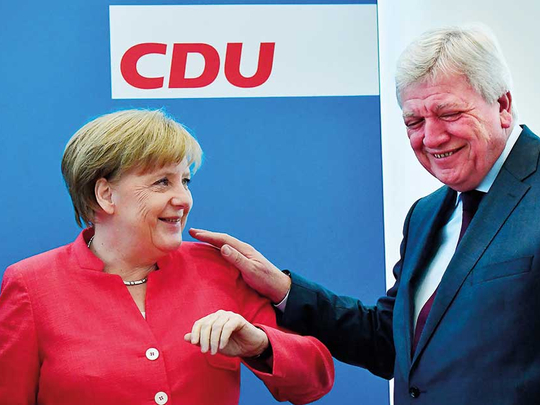
BERLIN: Chancellor Angela Merkel’s fourth-term government took nearly six months to put together, taking office in March after the centre-left Social Democrats reluctantly agreed to team up with her conservatives again. But the crisis shaking the new administration has come from within Merkel’s own conservative family, as her interior minister has pushed for Germany to turn back unilaterally some migrants at its border.
Merkel, widely viewed as a leader of liberal forces in Europe, is insisting on finding a wider European solution for the issue of immigration. However the dispute ends, it has exposed her government’s fragility at a difficult time for the continent.
Sibling rivalry
Two parties have made up Germany’s mainstream centre-right in the post-Second World War era: the Christian Democratic Union, currently led by Merkel” and the Christian Social Union, now led by Interior Minister Horst Seehofer. The CSU exists only in Bavaria, and the CDU in Germany’s other 15 states.
The two stay out of each other’s territory, but have a joint group in the federal parliament and campaign together in national elections. The CSU has governed Bavaria since 1957. Its dominance there makes it an important source of votes in a national election for the centre-right bloc collectively known as the Union.
The CSU is more conservative than Merkel’s CDU and its paramount aim is to maintain its dominance in Bavaria. Still, polls suggest that its absolute majority in the Bavarian state legislature is in danger in the Oct. 14 state election — and it is being challenged on the right by the far-right, anti-immigrant Alternative for Germany party.
Bavarian beef
Merkel has had an often-tense history with Seehofer, and their relationship became really difficult after Merkel’s 2015 decision to keep Germany’s borders open as migrants streamed across the Balkans. Seehofer — then the governor of Bavaria, where most migrants first entered Germany — became a leading critic of her welcoming approach. In 2016, he threatened Merkel’s federal government with a lawsuit if it didn’t take measures to further secure the border.
Hungarian Prime Minister Viktor Orban, an anti-migration hardliner, was invited to CSU meetings.
Merkel and Seehofer papered over the cracks ahead of last year’s national election, but support for both parties still dropped significantly. The CSU’s share of the vote in Bavaria dropped 10.5 percentage points to 38.8 per cent, with Alternative for Germany a major beneficiary. CSU leaders insisted that the causes for the drop in support were in Berlin, and that Germany’s migration policy was a major factor.
The poor showing also set off an internal power struggle: Seehofer salvaged his job as party leader, but gave up the Bavarian governor’s job to younger rival Markus Soeder. Seehofer entered Merkel’s government as interior minister, promising a “master plan” to tackle migration.
Soeder and the CSU’s ambitious top lawmaker in Berlin, Alexander Dobrindt, have sounded even tougher than Seehofer lately in demanding immediate action on immigration.
Merkel and migration
Merkel herself has come a long way since the fall of 2015, when she said that there was no legal limit to the number of people who have a right to asylum and told Germans that “we will manage” the challenge of integrating migrants, many of them from war-torn countries like Syria and Afghanistan.
In 2016, she was a prime mover behind a deal between the European Union and Turkey to stop migrants crossing the Aegean Sea to Greece. Her government toughened asylum rules and declared several countries “safe”, meaning people from there can’t expect to get refuge in Germany. She has also called for a “national effort” to ensure that rejected asylum seekers leave Germany.
However, Merkel has been unyielding in defending her initial decision to keep Germany’s borders open, telling lawmakers earlier this month that “in an exceptional humanitarian situation, Germany behaved very responsibly”. And she has stuck to her insistence that there needs to be a European-wide solution to migration issues, despite a lack of progress so far.
Merkel’s supporters argue that turning back migrants unilaterally would simply dump the problem on Mediterranean countries such as Italy and Greece, which would also weaken the European Union itself.












